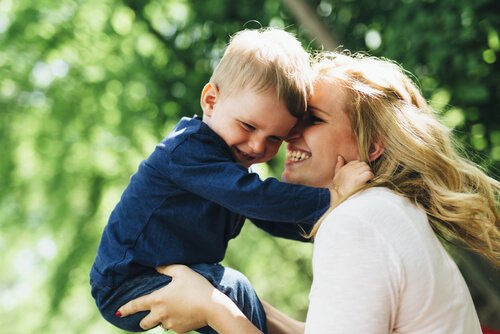Start Saying "Yes" to Positive Parenting

Science assures us that educating children in a positive way helps promote their development. Through positive child-raising, a child can come to be a healthier individual that is better prepared for life.
Of course, there are many more benefits. The main benefit of avoiding the word NO is that it leads to a more constructive relationship.
Children that grow up with positive parenting even help other children. Over time, they develop healthy behaviors based on tolerance, dialogue and respect.
Sometimes the word NO is the first thing that comes out of our mouths, even when our children are just babies – for example, when our babies start to walk or crawl and want to touch everything in sight.
We often resort to the word NO as a matter of convenience, to save time. Saying NO is quicker than taking the time to explain the reasoning behind it.
While these NOs are meant to keep our children safe, they are definitely not the best way to get our children to cooperate.
Studies have shown that the overuse of the word NO has a negative effect on a child’s linguistic abilities. Children who hear NO many times have poorer language than those who hear more positive responses from their parents.
Educating our children positively doesn’t mean giving into their every desire. Nor does it mean spoiling our children.

Abel Domínguez Llort, child psychologist and director of Domínguez Psicólogos in Madrid, Spain shares his thoughts on positive parenting:
As an ideal, it’s great: Trying to motivate children so that they concentrate on their possibilities, rather than their restrictions. This will produce less frustration for them in the immediate future.
He later adds:
But does today’s society prevent us from hearing the word NO? Are we always going to be reminded of all of the alternatives we have? I encourage you to use good judgement. Never saying NO to our children only makes them weak. As does saying NO all the time.
The goal is for children to understand why they aren’t allowed to do something or behave in a certain way. We should offer our little ones arguments that are appropriate for their age and experience.
There are many ways to help your child understand. You can even negotiate with your child as you present other options or activities. These alternatives are meant to dissuade your child from whatever it is you don’t want him to be doing.
What experts say about saying NO
Avoiding the word NO can often be a very complicated task. This is especially so when a child is behaving very badly or is about to hurt himself.
But remember, the idea isn’t to eliminate the word NO completely from your vocabulary. Rather, positive parenting is aimed at creating balance in your way of addressing your child. It’s about not saturating your child with the word NO.
Over time, constant use of the word no can lead children to feel afraid to explore the world around them. It may cause children to become uneasy, fearful and even anxious.
Specialists say that instead of saying NO, it’s better to try to communicate a possible alternative. The option you suggest should be more attractive than whatever the child is currently set on.

Ideally, according to Spanish psychologist and author Alicia Banderas, you should aim to keep your NOs at about 20%. The remaining 80% of the time, you should try to redirect your child by providing alternatives.
This helps your child reconsider, thus choosing the more appealing and acceptable option.
If children hear the word NO too often in the home, then they’ll become frustrated when they hear it in the home.
There does need to be a fair share of NOs, insists Banderas. And she adds the following to clarify the issue: When I want my daughter to understand something clearly, because it’s dangerous to her or because it can be dangerous to others, then I say NO. But other times we end up starting battles and we shouldn’t get into that dynamic continuously.
Clear limits
Avoiding excessive NOs doesn’t mean that mothers and fathers need to become submissive to their children. Parents still need to educate their little ones with norms and discipline.
Maintain clear limits and learn to say NO to your children when it’s necessary. This is the secret to an assertive education.
The authority that parents impose should be an open door that allows their children to learn from experience.
All children need rules and discipline in order to grow and develop in a healthy way… Emotionally, socially and psychologically.
The goal isn’t to censure your children to the point that they’re afraid to even start an activity. This is only counterproductive to their education.
Ideally, parents should guide their children in a healthy and positive way. This occurs through the use of a caring and affectionate dialogue.
Your clear responses should invite your children to make good decisions.
Science assures us that educating children in a positive way helps promote their development. Through positive child-raising, a child can come to be a healthier individual that is better prepared for life.
Of course, there are many more benefits. The main benefit of avoiding the word NO is that it leads to a more constructive relationship.
Children that grow up with positive parenting even help other children. Over time, they develop healthy behaviors based on tolerance, dialogue and respect.
Sometimes the word NO is the first thing that comes out of our mouths, even when our children are just babies – for example, when our babies start to walk or crawl and want to touch everything in sight.
We often resort to the word NO as a matter of convenience, to save time. Saying NO is quicker than taking the time to explain the reasoning behind it.
While these NOs are meant to keep our children safe, they are definitely not the best way to get our children to cooperate.
Studies have shown that the overuse of the word NO has a negative effect on a child’s linguistic abilities. Children who hear NO many times have poorer language than those who hear more positive responses from their parents.
Educating our children positively doesn’t mean giving into their every desire. Nor does it mean spoiling our children.

Abel Domínguez Llort, child psychologist and director of Domínguez Psicólogos in Madrid, Spain shares his thoughts on positive parenting:
As an ideal, it’s great: Trying to motivate children so that they concentrate on their possibilities, rather than their restrictions. This will produce less frustration for them in the immediate future.
He later adds:
But does today’s society prevent us from hearing the word NO? Are we always going to be reminded of all of the alternatives we have? I encourage you to use good judgement. Never saying NO to our children only makes them weak. As does saying NO all the time.
The goal is for children to understand why they aren’t allowed to do something or behave in a certain way. We should offer our little ones arguments that are appropriate for their age and experience.
There are many ways to help your child understand. You can even negotiate with your child as you present other options or activities. These alternatives are meant to dissuade your child from whatever it is you don’t want him to be doing.
What experts say about saying NO
Avoiding the word NO can often be a very complicated task. This is especially so when a child is behaving very badly or is about to hurt himself.
But remember, the idea isn’t to eliminate the word NO completely from your vocabulary. Rather, positive parenting is aimed at creating balance in your way of addressing your child. It’s about not saturating your child with the word NO.
Over time, constant use of the word no can lead children to feel afraid to explore the world around them. It may cause children to become uneasy, fearful and even anxious.
Specialists say that instead of saying NO, it’s better to try to communicate a possible alternative. The option you suggest should be more attractive than whatever the child is currently set on.

Ideally, according to Spanish psychologist and author Alicia Banderas, you should aim to keep your NOs at about 20%. The remaining 80% of the time, you should try to redirect your child by providing alternatives.
This helps your child reconsider, thus choosing the more appealing and acceptable option.
If children hear the word NO too often in the home, then they’ll become frustrated when they hear it in the home.
There does need to be a fair share of NOs, insists Banderas. And she adds the following to clarify the issue: When I want my daughter to understand something clearly, because it’s dangerous to her or because it can be dangerous to others, then I say NO. But other times we end up starting battles and we shouldn’t get into that dynamic continuously.
Clear limits
Avoiding excessive NOs doesn’t mean that mothers and fathers need to become submissive to their children. Parents still need to educate their little ones with norms and discipline.
Maintain clear limits and learn to say NO to your children when it’s necessary. This is the secret to an assertive education.
The authority that parents impose should be an open door that allows their children to learn from experience.
All children need rules and discipline in order to grow and develop in a healthy way… Emotionally, socially and psychologically.
The goal isn’t to censure your children to the point that they’re afraid to even start an activity. This is only counterproductive to their education.
Ideally, parents should guide their children in a healthy and positive way. This occurs through the use of a caring and affectionate dialogue.
Your clear responses should invite your children to make good decisions.
All cited sources were thoroughly reviewed by our team to ensure their quality, reliability, currency, and validity. The bibliography of this article was considered reliable and of academic or scientific accuracy.
- Carmen, D., & Carrasquillo, Y. (2018). DISCIPLINA POSITIVA: HERRAMIENTA PARA LOS PADRES. Educrea.
- Nelsen, J. (2001). Disciplina positiva. Editora Cultrix.
- Escrivá, M. V. M., García, P. S., Porcar, A. M. T., & Díez, I. (2001). Estilos de crianza y desarrollo prosocial de los hijos. Revista de psicología general y aplicada: Revista de la Federación Española de Asociaciones de Psicología, 54(4), 691-703. https://dialnet.unirioja.es/descarga/articulo/2364995.pdf
- Rangel, J. V. (2003). Estilos de crianza, estilos educativos y socialización:¿ Fuentes de bienestar psicológico?. Acción pedagógica, 12(1), 48-55. https://dialnet.unirioja.es/servlet/articulo?codigo=2972859
- Jorge, E., & González, M. C. (2017). Estilos de crianza parental: una revisión teórica. Informes Psicológicos, 17(2), 39-66. https://dialnet.unirioja.es/servlet/articulo?codigo=7044268
- Mestre, M. V., Tur, A. M., Samper, P., Nácher, M. J., & Cortés, M. T. (2007). Estilos de crianza en la adolescencia y su relación con el comportamiento prosocial. Revista latinoamericana de psicología, 39(2), 211-225. https://www.redalyc.org/pdf/805/80539201.pdf
- Rojas, M. (2015). Felicidad y estilos de crianza parental. Documento de Trabajo). México: Centro de Estudios Espinosa Yglesias. https://ceey.org.mx/wp-content/uploads/2018/06/16-Rojas-2015.pdf
This text is provided for informational purposes only and does not replace consultation with a professional. If in doubt, consult your specialist.








